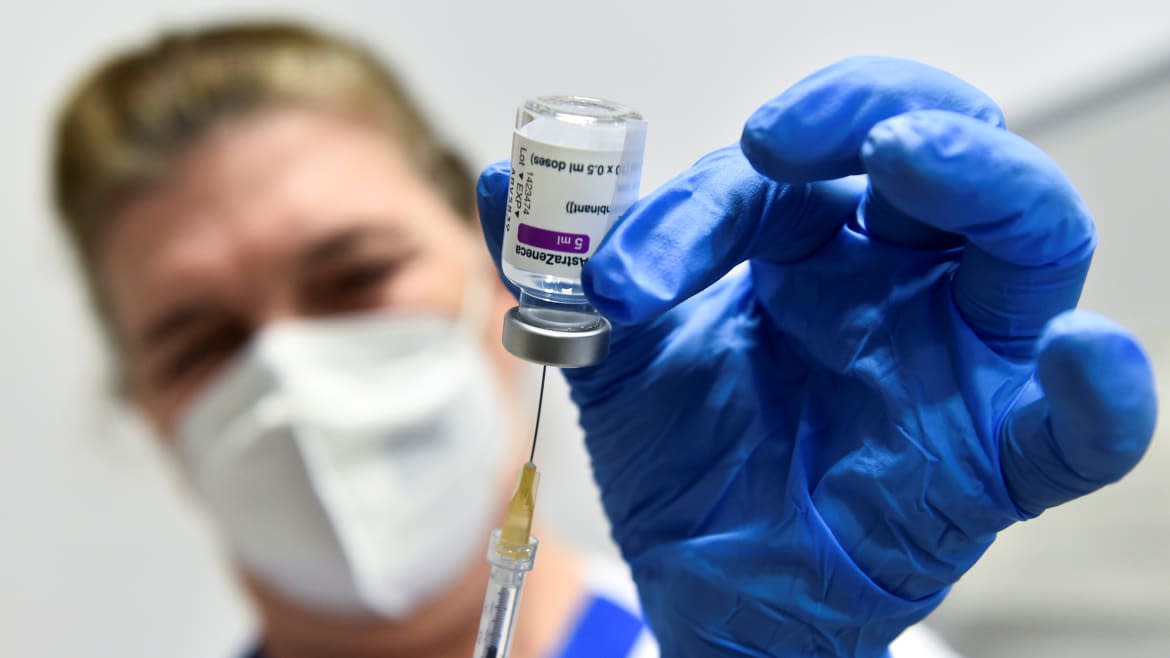Fake News and Murder Charges: How Italy Became Ground Zero for AstraZeneca’s Disastrous Rollout

ROME—Nothing kills faith in a vaccine quite like manslaughter charges implying that it’s lethal. It helps little when the same drugmaker is accused of fudging data and hiding millions of vials in a warehouse inside Italy—a country experiencing massive vaccine shortages.
The Oxford-AstraZeneca COVID-19 Vaccine Was Paused. That’s a Good Thing.
But such is the story of AstraZeneca’s COVID-19 vaccine curse. Once hoped to be the workhorse of the European Union’s vaccine program, the AstraZeneca vaccine was meant to offer an escape route out of the pandemic But now people are rolling their sleeves back down at the thought of getting an AZ jab.
But for all the bad press, little of it is actually true.
News reports Wednesday morning out of Italy screamed that the company had hidden or lost 30 million doses in a warehouse south of Rome—around the same number of doses they failed to deliver to the continent thanks to what they had, at the time, called production glitches.
But the 30 million doses in the Catalent finishing facility that La Stampa newspaper claimed were lost were actually well-documented and inventoried, a representative for Catalent told The Daily Beast.
They all had lot numbers and none were ever intended for Europe. Instead, most were prepared to be sent to third-world countries as part of the Covax agreement. A small number of the vials were destined for the U.K., which would likely be blocked by a European Union ban on exports of vaccines made in Europe (and a precedent set by Italy earlier this month when the country banned AstraZeneca exports to Australia). And the rest are earmarked for the European Union, according to AstraZeneca. But the doses were not “found” because, in fact, they had never been “lost.”
AstraZeneca also issued a statement meant to clarify its distribution. “There are no exports currently planned other than to COVAX countries,” the statement said. “It is incorrect to describe this as a stockpile. The process of manufacturing vaccines is very complex and time consuming. In particular, vaccine doses must wait for quality control clearance after the filling of vials is completed.”
Whether those doses should or should not be distributed in Europe is an entirely different question and one no one The Daily Beast contacted seemed to be able to answer. “There are protocols to follow on the distribution of these vaccines,” Antonio Addis, head of the Dept. of Epidemiology in Rome’s First Municipal Medical district says. “You cannot just go into a warehouse and take the vials intended for someone else because you are running short.”
But missing doses are not AstraZeneca’s only woes. The vaccine hit another glitch this week when American drug regulators publicly questioned whether the company had supplied outdated data on the trials under consideration. A midnight missive Sunday came after the British-Swedish drug maker released a press release over the weekend touting a level of effectiveness that it claimed paved the way to FDA approval. Both sides now say they are updating data and that the vaccine is still on target to be approved for use in the U.S. in April.
But the most devastating hit has been lingering doubt about whether the jab causes sometimes-fatal blood clots, which led to a manslaughter investigation into two doctors and a nurse who injected someone who later died in Italy. Last week, after a dozen countries suspended the vaccine’s use, the European drug regulator deemed it safe but insisted labeling should be updated to hint that some people may experience clotting. Most countries brought the vaccine back online, but notably Sweden—one of AstraZeneca’s home countries—did not.
The Italian manslaughter case is still ongoing after a Sicilian prosecutor ordered the sequester—by SWAT team no less—of thousands of vials on March 11. When the manslaughter suit was launched, the head of the World Medical Association, which represents doctors from 115 countries, said the damage from the investigation would be devastating. “In any other country in the European Union, this would not be considered manslaughter,” Frank Montgomery, the World Medical Association’s chairperson, told Reuters. “Possible side-effects from a vaccination would never lead to the prosecution of a doctor.”
Italy’s legal system allows for manslaughter investigations to be easily launched when someone dies, in part to secure transparency to all evidence collected in a wrongful death investigation. The most famous case came after an earthquake in L’Aquila in 2006 led to the conviction and then acquittal of scientists who told local residents not to worry about increased seismic activity and “go home and have a glass of wine” instead. When a deadly quake struck and killed hundreds, the seismologists and scientists were arrested and tried for murder. In the case of the earthquake, the scientists were eventually acquitted on appeal, but the damage done to confidence in the scientific community has yet to be rebuilt.
The same is likely the case for AstraZeneca, which continues to feel the aftershocks of its less than stable rollout.
Get our top stories in your inbox every day. Sign up now!
Daily Beast Membership: Beast Inside goes deeper on the stories that matter to you. Learn more.

